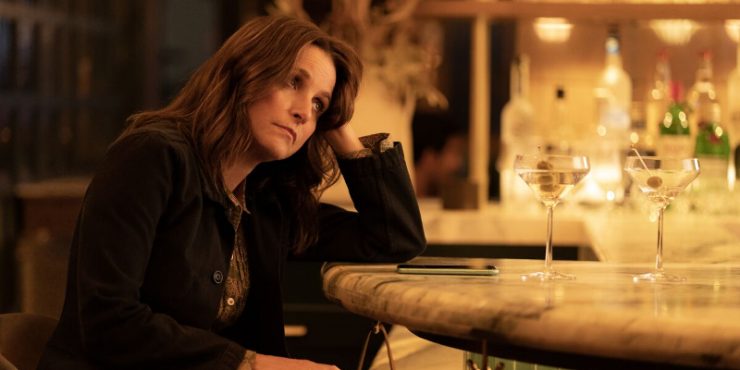Among the greatest actors in the history of television comedy, Julia Louis-Dreyfus’s career is peerless in both quality and sustainability. In the movies, it’s only writer-director Nicole Holofcener that has ever been able to showcase everything Louis-Dreyfus can bring to the table. Her sharp comedic timing is on full display, but Holofcener also taps into a well of feeling that the eleven-time Emmy-winner hardly ever gets to show otherwise. Enough Said in 2013 was one of the best romantic comedies of that decade, and Louis-Dreyfus proved a perfect match for Holofcener’s sardonic, melancholy humor. Their latest collaboration, You Hurt My Feelings, plays in a similar vein, taking a soft, nuanced view of the complexity within our closest relationships, focusing on a lie that causes a spiral within a successful marriage.
Louis-Dreyfus plays Beth, a published author whose commercial success has diminished over time. Mostly a writer of non-fiction, she is trying her hand at a novel. Her husband, Don (Tobias Menzies), is a therapist who worries about getting older and if he still has the goods to help his patients – some of whom are turning on him. Their son, Elliot (Owen Teague) manages a cannabis store in Manhattan and worries about the trajectory of his long-term professional prospects. Beth’s sister Sarah (Michaela Watkins) is a frustrated interior designer to vain millionaires. She’s married to Mark (Arian Moayed), an insecure actor still looking for a breakthrough despite entering the middle of his forties. Beth and Sarah’s mother, Georgia (a brilliant Jeannie Berlin), hands out her fair amount of sass, but she’s becoming unsteady and forgetful, a state her daughters are trying to keep an eye on.
Even at 93 minutes, You Hurt My Feelings paints a broad canvas of privileged Manhattanite ennui. The movie is less focused on Beth than you might expect from a trailer or poster, generously entering the worlds of Don or Sarah or Mark, giving them their proper space to present their own sympathetic vantage points. All four of them are faced with some form of mid-life anxiety, professional and personal. Beth and Don’s committed, physically intimate relationship feels especially solid, so much so that their PDA annoys Elliot. Things turn sour when Beth overhears Don telling Mark that he doesn’t like her novel, a statement that contradicts years of unwavering support and encouragement. Hearing this unmoors Beth, who finds herself instantly unable to trust the husband that she loves so much.
Holofcener has always had a more holistic approach to narrative, preferring to let the performances from her actors guide the story as opposed to forcing them into the confines of her script. This plays into the shakier aspects of her directorial approach, which is much more Apatow-ian than some are willing to admit. When you see what a proven stylist like Marielle Heller can do with Holofcener’s incredible Can You Ever Forgive Me? script, you begin to yearn for her to give up the directing reigns more often. That said, Holofcener’s modest visual aesthetic often plays into the simplicity of her storytelling approach. Her writing can shift so effortlessly between comedy and drama, a trait she likes to highlight more than visual flair. You Hurt My Feelings might be the most genuinely funny movie she’s ever made, and she pulls it off without sacrificing her patented melancholic punch.
The movie just misses the triumph of Enough Said, a movie that hits its every note with an almost extreme precision and grace. Despite giving a solid performance, Tobias Menzies doesn’t quite reach the level of Said‘s James Gandolfini. Louis-Dreyfus’s scenes with Watkins and Berlin have more spark and chemistry, which might explain why they take up so much real estate within the movie. You Hurt My Feelings‘ more dramatic moments sometimes feel pat compared to its humorous beats – Owen Teague, in particular is saddled with some of the more heavy-handed dialogue of Holofcener’s career. The substance of what the film has to say about relationships and thin lines between dishonesty and support is salient even if its execution occasionally feels on-the-nose.
This is still a better, more incisive comedy than nearly anything currently available, even if it doesn’t quite meet the standard that Holofcener has set for herself. Louis-Dreyfus as Beth is once again tremendous, perfectly illustrating how the life of an artist can blur into your personal relationships. Beth never knew how it important it was to her that Don found her talented until the moment it became possible that he might not. That one, off-hand comment – possibly motivated more by professional frustration than actual distaste for the book – totally reimagines Beth’s view of her marriage and her career. Louis-Dreyfus portrays Beth as wounded but steely, treating Don’s opinion like something akin to an affair. It’s another incredible performance, and just more proof that there is still even more to Julia Louis-Dreyfus than we currently know.
Written and Directed by Nicole Holofcener










